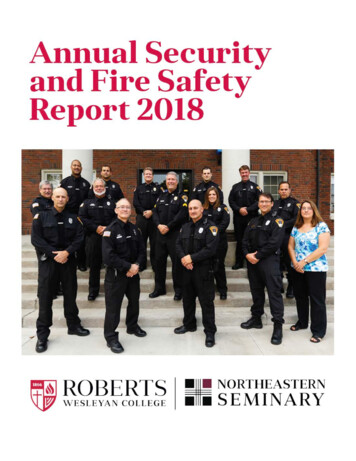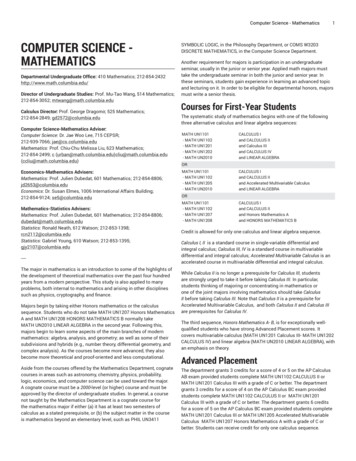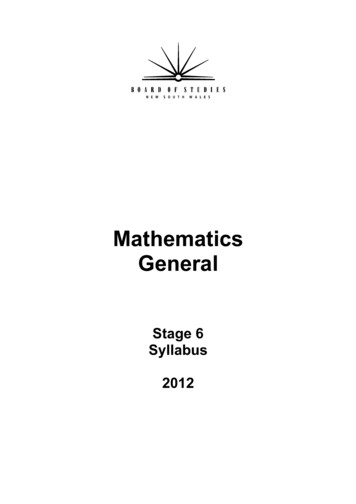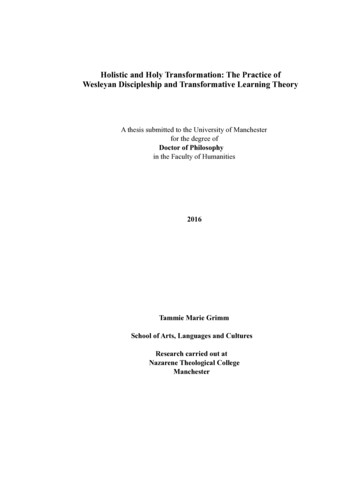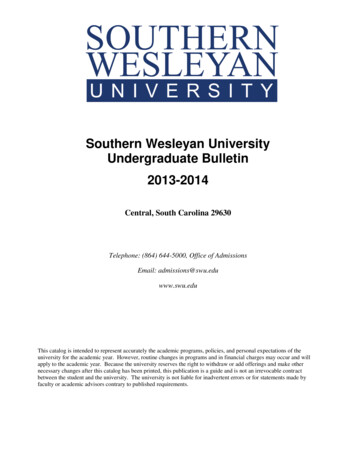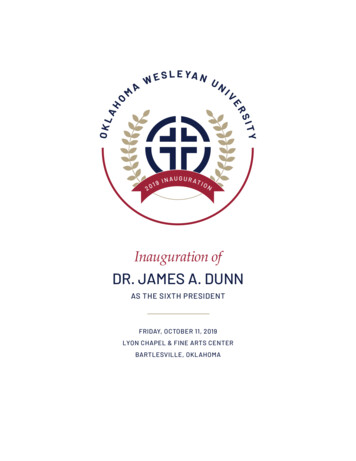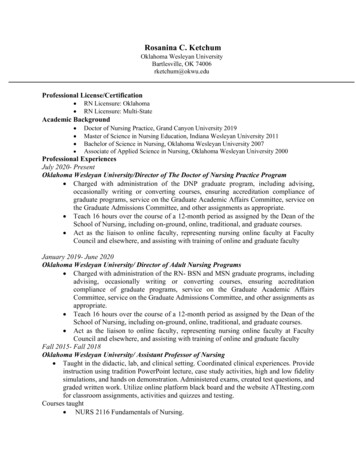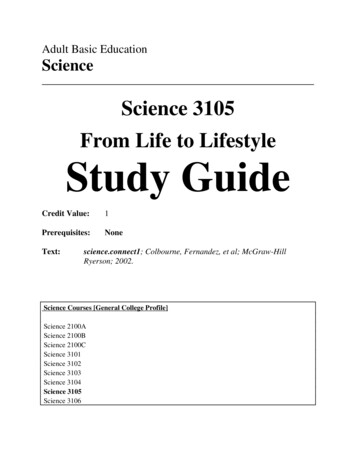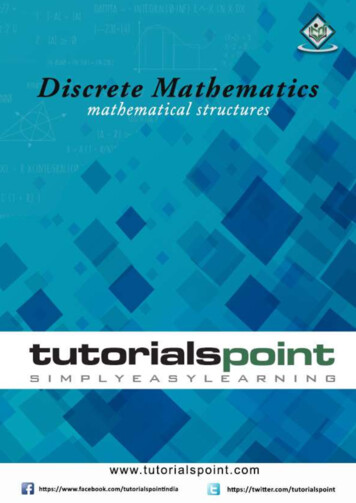
Transcription
Mathematics and Computer ScienceMATHEMATICS ANDCOMPUTER SCIENCEThe Department of Mathematics and Computer Science offers undergraduatemajors in mathematics and in computer science. We also participate in theInformatics and Modeling Certificate Program. The department's graduateprograms include a PhD in mathematics and MA programs in mathematics and incomputer science.Each student's course of study is designed to provide an introduction to the basicareas of mathematics or computer science and to provide the technical toolsthat will be useful later in the student's career. The course of study is plannedin consultation with the student's faculty advisor and the department's advisorycommittees, DADCOM for mathematics and CADCOM for computer science.The department's graduate programs include a PhD program in mathematics andMA programs in mathematics and in computer science. The research emphasis atWesleyan at the doctoral level is in pure mathematics and theoretical computerscience. One of the distinctive features of our department is the close interactionbetween the computer science faculty and the mathematics faculty, particularlythose in logic and discrete mathematics.Graduate students at Wesleyan enjoy small classes and close interactions withfaculty and fellow graduate students. Graduate students normally register forthree classes a semester and are expected to attend departmental colloquia andat least one regular seminar. The number of graduate students ranges from 17 to21, with an entering class of three to six each year. There have always been bothmale and female students, graduates of small colleges and large universities,and U.S. and international students, including, in recent years, students fromBulgaria, Chile, China, Germany, India, Iran, and Sri Lanka. All of the department'srecent PhD recipients have obtained faculty positions. Some have subsequentlymoved to mathematical careers in industry and government.For additional information, please visit wesleyan.edu/mathcs/graduate/ Ilesanmi AdeboyePHD, University of MichiganAssociate Professor of MathematicsWai Kiu ChanBS, University of Hong Kong; MPHIL, University of Hong Kong; PHD, The OhioState UniversityProfessor of MathematicsKaren L. CollinsBA, Smith College; PHD, Massachusetts Institute of TechnologyEdward Burr Van Vleck Professor of Mathematics; Professor of Mathematics;Chair, Mathematics and Computer Science; Professor, Integrative SciencesDavid ConstantineBS, Eastern Nazarene College; PHD, University of MichiganAssociate Professor of MathematicsNorman DannerBA, University of California, Berkeley; PHD, Indiana University BloomingtonAssociate Professor of Computer Science; Vice-Chair, Mathematics andComputer ScienceAdam FieldsteelBA, Brown University; MAA, Wesleyan University; PHD, University of California,BerkeleyProfessor of MathematicsCameron Donnay HillBA, Yale University; PHD, University of California, BerkeleyAssociate Professor of Mathematics; Associate Professor, Integrative SciencesMark A. HoveyBS, Ohio State University; PHD, Massachusetts Institute of TechnologyAssociate Provost for Budget and Personnel; Professor of Mathematics;Professor, Integrative SciencesSara Kalisnik VerovsekPHD, Stanford UniversityAssistant Professor of MathematicsDaniel KrizancBS, University of Toronto; PHD, Harvard UniversityEdward Burr Van Vleck Professor of Computer Science; Professor of ComputerScience; Professor, Integrative Sciences; Professor, Environmental Studies; CoCoordinator, Informatics and ModelingAlex KruckmanPHD, University of California, Berkeley; SB, Brown UniversityAssistant Professor of MathematicsConstance LeidyBS, Tulane University; PHD, Rice UniversityAssociate Professor of MathematicsHan LiBS, Nankai University; PHD, Yale UniversityAssistant Professor of MathematicsDan LicataBS, Brown University; PHD, Carnegie Mellon UniversityAssociate Professor of Computer ScienceJames LiptonBS, U Nebraska Lincoln; MSC, Cornell University; PHD, Cornell UniversityProfessor of Computer Science; Professor, Integrative SciencesVictoria Ursula ManfrediBA, Smith College; MS, University of Massachusetts Amherst; PHD, University ofMassachusetts AmherstAssistant Professor of Computer ScienceDavid PollackMA, Harvard University; PHD, Harvard University; SB, University of ChicagoAssociate Professor of MathematicsFelipe A. RamírezBS, Colorado St University; PHD, University of MichiganAssistant Professor of MathematicsChristopher RasmussenBA, University of Virginia; MS, University of Virginia; PHD, University of ArizonaAssociate Professor of MathematicsSaray ShaiBS, Israel Institute of Technology; PHD, University of St Andrews1
2Mathematics and Computer ScienceAssistant Professor of Computer ScienceProfessor of Mathematics, EmeritusEmily R. StarkBA, Pomona College; MA, Tufts University; PHD, Tufts UniversityAssistant Professor of MathematicsMichael D. RiceBS, Western Mich University; MS, Western Mich University; PHD, WesleyanUniversityProfessor of Computer Science, EmeritusSebastian ZimmeckLLM, University of California, Berkeley; MS, Columbia University; PHD, Universityof Kiel; PHD, Columbia UniversityAssistant Professor of Computer ScienceAFFILIATED FACULTYTsampikos KottosBA, University of Crete; MS, University of Crete; PHD, University of CreteLauren B. Dachs Professor of Science and Society; Professor of Physics; Professor,Integrative Sciences; Professor, MathematicsVISITING FACULTYAnurag RaoBS, St. Xavier's College; MS, Indian Statistical Institute; PHD, Brandeis UniversityVisiting Assistant Professor of MathematicsPhilip H. ScowcroftBA, Harvard University; MA, Cornell University; PHD, Cornell UniversityEdward Burr Van Vleck Professor of Mathematics, EmeritusCarol S. WoodAB, Randolph Macon W College; MAA, Wesleyan University; PHD, Yale UniversityEdward Burr Van Vleck Professor of Mathematics, EmeritaDEPARTMENTAL UNDERGRADUATEADVISING EXPERTSDADCOM provides advice and transfer credit approval for students inmathematics. CADCOM provides advice and transfer credit approval for studentsin computer science. Undergraduate Computer Science Major d-comp/)Robert RoseBA, Lamar University; MA, Louisiana State University; PHD, Indiana UniversityBloomingtonPostdoctoral Fellow in Computer Science Undergraduate Mathematics Major d-math/)Elvin ShresthaBA, Kenyon CollegeGraduate Student, MATH-PHD; Visiting Instructor in Mathematics Master of Arts in Mathematics and Computer Science d-ma/) Doctor of Philosophy in Mathematics d-math-phd/)Sunrose ShresthaBA, Hamilton College; MS, Tufts University; PHD, Tufts UniversityVan Vleck Postdoctoral Fellow in MathematicsCOMPUTER SCIENCEPippin WolfeBA, Brown University; BS, Brown University; PHD, University of MassachusettsAmherstPostdoctoral Fellow in Computer ScienceCOMP112 Introduction to ProgrammingThe course will provide an introduction to a modern, high-level programminglanguage including a discussion of input/output, basic control structures, types,functions, and classes. The lectures will also discuss a variety of algorithms aswell as program design issues.Arianna M ZikosMA, University Of Toledo; BS, Bridgewater State CollegeGraduate Student, MATH-PHD; Visiting Instructor in MathematicsEMERITIEthan M. CovenBA, University of Rochester; MA, Yale University; MAA, Wesleyan University;PHD, Yale UniversityProfessor of Mathematics, EmeritusAnthony W. HagerBS, Pennsylvania State University; PHD, Pennsylvania State UniversityProfessor of Mathematics, EmeritusMichael S. KeaneBA, University of Texas Austin; MS, University of Gottingen; PHD, University ofErlangen-NurnberThe second meeting time for each section is a computer lab.Offering: HostGrading: OPTCredits: 1.00Gen Ed Area: NSM-MATHPrereq: NoneCOMP112Z Introduction to ProgrammingThe course will provide an introduction to a modern, high-level programminglanguage including a discussion of input/output, basic control structures, types,functions, and classes. The lectures will also discuss a variety of algorithms aswell as program design issues.The second meeting time for each section is a computer lab.Offering: HostGrading: OPTCredits: 1.00Gen Ed Area: NSM-MATHPrereq: None
Mathematics and Computer ScienceCOMP113 Bioinformatics ProgrammingThis course is an introduction to bioinformatics and programming for studentswith interest in the life sciences. It introduces problem areas and conceptualframeworks in bioinformatics. The course assumes little or no prior programmingexperience and will introduce the fundamental concepts and mechanisms ofcomputer programs and examples (e.g., sequence matching and manipulation,database access, output parsing, dynamic programming) frequently encounteredin the field of bioinformatics.Offering: CrosslistingGrading: A-FCredits: 1.00Gen Ed Area: NSM-BIOLIdentical With: BIOL265, MB&B265, CIS265Prereq: [MB&B181 or BIOL181]COMP114 How to Talk to MachinesHow do we tell robots and computers how to do what they do? Getting a handleon this question is the goal of this course. Since telling a device how to dosomething depends a lot on what that device can do, along the way we will learna bit about what is "in the box." We will start with the kind of programming onemight use to instruct a robot how to interact with the world around it. That willlead us to the Turing machine, a beautiful mathematical model of a computer.We will adapt that model to something that is closer to how most computersystems today are designed. We will end with an introduction to high-levelprogramming, learning the fundamentals of programming in a language such asPython or Java.The goal of the course is to understand not just programming, but howcomputers are designed, and how those designs are reflected in the way weprogram them. After passing this course, students will have a basic knowledge ofprogramming and how a computer works. COMP 114 can be used to satisfy theCOMP 211 prerequisite and also the mathematics major "elementary knowledgeof algorithms and computer programming" requirement.Offering: HostGrading: OPTCredits: 1.00Gen Ed Area: NSM-MATHPrereq: NoneCOMP114Z How to Talk to MachinesHow do we tell robots and computers how to do what they do? Getting a handleon this question is the goal of this course. Since telling a device how to dosomething depends a lot on what that device can do, along the way we will learna bit about what is "in the box." We will start with the kind of programming onemight use to instruct a robot how to interact with the world around it. That willlead us to the Turing machine, a beautiful mathematical model of a computer.We will adapt that model to something that is closer to how most computersystems today are designed. We will end with an introduction to high-levelprogramming, learning the fundamentals of programming in a language such asPython or Java.Offering: HostGrading: OPTCredits: 1.00Gen Ed Area: NSM-MATHPrereq: NoneCOMP115 How to Design ProgramsIn this course, students will learn to systematically design programs, going froma problem statement to a well-organized solution in a step-by-step fashion. Wewill apply these program design skills to many applications within computerscience and in other disciplines. Students will develop their mathematical skills,because we will use a symbolic view of computation that explains the processof running a program as simple manipulations of its text. Students will alsodevelop their technical reading and writing skills, such as understanding complex3problem descriptions and precisely articulating the design of solutions. No priorexperience with programming or computer science is expected.Offering: HostGrading: OPTCredits: 1.00Gen Ed Area: NSM-MATHPrereq: NoneCOMP211 Computer Science IThis is the first course in a two-course sequence (COMP211-212) that is thegateway to the computer science major. It is intended for prospective computerscience majors and others who want an in-depth understanding of programmingand computer science. Topics to be covered in COMP211-212 include anintroduction to the fundamental ideas of programming in imperative andfunctional languages, correctness and cost specifications, and proof techniquesfor verifying specifications.Specifics such as choice of programming language, which topics are covered inwhich semesters, etc., will vary according to the tastes of the faculty offering thecourses.Offering: HostGrading: OPTCredits: 1.00Gen Ed Area: NSM-MATHPrereq: COMP112 OR COMP113 OR COMP114 OR COMP115COMP212 Computer Science IIThis is the second course in a two-course sequence (COMP211-212) that is thegateway to the computer science major. It is intended for prospective computerscience majors and others who want an in-depth understanding of programmingand computer science. Topics to be covered in COMP211-212 include anintroduction to the fundamental ideas of programming in imperative andfunctional languages, correctness and cost specifications, and proof techniquesfor verifying specifications.Specifics such as choice of programming language, which topics are covered inwhich semesters, etc., will vary according to the tastes of the faculty offering thecourses.Offering: HostGrading: OPTCredits: 1.00Gen Ed Area: NSM-MATHPrereq: COMP211COMP260 Special Topics in Computer ScienceThis course is designed for nonmajors who wish to pursue some topic incomputer science beyond introduction to programming. Topics will varyaccording to the instructor.Offering: HostGrading: A-FCredits: 1.00Gen Ed Area: NSM-MATHIdentical With: QAC260Prereq: COMP112COMP260A Software Design and EngineeringProgramming is only one ingredient for creating industry-grade software.Eliciting requirements from stakeholders, modeling the architecture of asystem, selecting appropriate development tools, and testing and maintaininga codebase are some of the aspects that elevate programming to softwareengineering. Focusing on the development of mobile and web apps, students inthis course will gain expertise in common front-end and back-end technologiesas well as related tooling. We will also cover the organization of softwareprojects and their social implications, which are so important to recognize for themodern software engineer.
4Mathematics and Computer ScienceOffering: HostGrading: A-FCredits: 1.00Gen Ed Area: NonePrereq: COMP112COMP260B Scientific ComputingThis course will introduce students from various disciplines to computingas applied to scientific problems. The course aims to provide a theoreticalbackground in computational sciences and insight in understanding how popularalgorithms and advances in hardware are used to solve problems drawn fromchemistry, physics, biology, and bioinformatics. Topics covered will includesimulation techniques, analysis of trajectories, clustering, probabilistic modeling,networks, artificial intelligence, neural networks, population dynamics, and highperformance computing.Offering: HostGrading: OPTCredits: 1.00Gen Ed Area: NSM-MATHPrereq: COMP211COMP266 BioinformaticsThis course is an introduction to bioinformatics for students with interestin the life sciences. The course is similar to BIOL265 but only meets in thesecond half of the semester (with BIOL265) and is designed for students withprogramming background, ideally in Python. The course introduces problemareas and conceptual frameworks in bioinformatics and discusses programmingapproaches used in bioinformatics such as sequence matching and manipulationalgorithms using dynamic programming, clustering analysis of gene expressiondata, analysis of genetic nets using Object Oriented Programming, and sequenceanalysis using Hidden Markov Models, Regular Expressions, and informationtheory.Offering: CrosslistingGrading: A-FCredits: 0.50Gen Ed Area: NSM-BIOLIdentical With: BIOL266, MB&B266, CIS266Prereq: [MB&B181 OR BIOL181]COMP301 Automata Theory and Formal LanguagesThis course is an introduction to formalisms studied in computer scienceand mathematical models of computing machines. The language formalismsdiscussed will include regular, context-free, recursive, and recursivelyenumerable languages. The machine models discussed include finite-stateautomata, pushdown automata, and Turing machines.Offering: HostGrading: OPTCredits: 1.00Gen Ed Area: NSM-MATHIdentical With: COMP500Prereq: COMP211 AND COMP212 AND MATH228COMP312 Algorithms and ComplexityThe course will cover the design and analysis of efficient algorithms. Basictopics will include greedy algorithms, divide-and-conquer algorithms, dynamicprogramming, and graph algorithms. Some advanced topics in algorithms may beselected from other areas of computer science.Offering: HostGrading: OPTCredits: 1.00Gen Ed Area: NSM-MATHIdentical With: COMP510Prereq: COMP212 AND MATH228COMP321 Design of Programming LanguagesThis course is an introduction to concepts in programming languages. Topicsinclude parameter passing, type checking and inference, control mechanisms,data abstraction, module systems, and concurrency. Basic ideas in functional,object-oriented, and logic programming languages will be discussed.Offering: HostGrading: OPTCredits: 1.00Gen Ed Area: NSM-MATHIdentical With: COMP521Prereq: COMP212 AND MATH228COMP323 Programming Language ImplementationThis course is an introduction to the implementation of programming languages.Students will learn how to formally describe and implement major componentsof the implementation pipeline. Topics may include lexical analysis and parsing(checking whether source code is well-formed and converting it to an internalprogrammatic representation), type-checking and -inference (static programanalysis for safety features), interpretation (direct execution of a high-levellanguage program), and compilation (translation to a low-level language such asassembly or bytecode).Offering: HostGrading: A-FCredits: 1.00Gen Ed Area: NSM-MATHIdentical With: COMP523Prereq: COMP212 AND MATH228COMP327 Evolutionary and Ecological BioinformaticsBioinformatic analysis of gene sequences and gene expression patterns hasadded enormously to our understanding of ecology and evolution. For example,through bioinformatic analysis of gene sequences, we can now reconstructthe evolutionary history of physiology, even though no traces of physiologyexist in the fossil record. We can determine the adaptive history of one geneand all the gene's descendants. We can now construct the evolutionary treeof all of life. Bioinformatics is particularly promising for analysis of the ecologyand biodiversity of microbial communities, since well over 99 percent ofmicroorganisms cannot be cultured; our only knowledge of these organismsis through analysis of their gene sequences and gene expression patterns. Forexample, even when we cannot culture most of a microbial community, wecan determine which metabolic pathways are of greatest significance throughanalysis of community-level gene expression. All these research programs aremade accessible not only by breakthroughs in molecular technology but also byinnovation in the design of computer algorithms. This course, team-taught by anevolutionary biologist and a computer scientist, will present how bioinformaticsis revolutionizing evolutionary and ecological investigation and will presentthe design and construction of bioinformatic computer algorithms underlyingthe revolution in biology. Students will learn algorithms for reconstructingphylogeny, for sequence alignment, and for analysis of genomes, and studentswill have an opportunity to create their own algorithms.Offering: CrosslistingGrading: A-FCredits: 1.00Gen Ed Area: NSM-BIOLIdentical With: BIOL327, BIOL527, COMP527, CIS327Prereq: [BIOL182 or MB&B182] OR [BIOL196 or MBB196] OR COMP112 ORCOMP211COMP331 Computer Structure and OrganizationThe purpose of the course is to introduce and discuss the structure andoperation of digital computers. Topics will include the logic of circuits,microarchitectures, microprogramming, conventional machine architectures,
Mathematics and Computer Scienceand an introduction to software/hardware interface issues. Assembly languageprogramming will be used to demonstrate some of the basic concepts.Offering: HostGrading: OPTCredits: 1.00Gen Ed Area: NSM-MATHIdentical With: COMP531Prereq: COMP212COMP332 Computer NetworksThis course will provide an introduction to the fundamentals of computernetworks. Computer networks have become embedded in our everyday lives,from the Internet to cellular phones to cloud networking, enabling applicationssuch as email, texting, web browsing, on-demand video, video conferencing,peer-to-peer file sharing, social networking, cloud computing, and more.This course will delve into the infrastructure and protocols that have allowedcomputer networks to achieve their current ubiquity. While the primary focus ofthe course will be on the Internet's architecture, protocols, and applications, wewill also touch on other types of computer networks. Programming assignmentswill be done using Python; prior knowledge of Python is not required.Offering: HostGrading: A-FCredits: 1.00Gen Ed Area: NSM-MATHPrereq: COMP212 and MATH228COMP333 Software EngineeringSoftware engineering is the application of engineering principles to the softwaredevelopment process. Eliciting requirements from stakeholders, designing thearchitecture of a program, performing usability studies, and testing a codebaseare some of the aspects that elevate program development to softwareengineering. Focusing on web and mobile apps, students in this course willgain expertise in state-of-the-art frontend, backend, and mobile technologies,as well as related tooling. We will also cover the collaborative organization ofsoftware projects, software licensing, software business models, and ethicalconsiderations for professional software engineers.Offering: HostGrading: OPTCredits: 1.00Gen Ed Area: NSM-MATHPrereq: COMP211 AND COMP212COMP341 Artificial IntelligenceThis course is an introduction to creating programs that appear to behaveintelligently. Topics will include search algorithms for problem solving, as wellas probabilistic reasoning, including regression, classification, and decisionmaking. Sample topics include Bayesian networks, basic neural networks andreinforcement learning.Offering: HostGrading: A-FCredits: 1.00Gen Ed Area: NSM-MATHPrereq: COMP212 AND MATH228COMP343 Machine LearningThis course will provide an introduction to machine learning. The field ofmachine learning studies how to design systems that learn from experience.We will cover fundamental concepts and algorithms used in machine learning,as well as give an introduction to basic probability and statistics. Sample topicsinclude regression, classification, Bayesian networks, Gibbs sampling, particlefiltering, maximum likelihood estimation, neural networks, deep learning,clustering, bias/variance trade-offs, cross-validation, and practical advice.Programming assignments will be done using Python; prior knowledge of Pythonis not required.5Offering: HostGrading: A-FCredits: 1.00Gen Ed Area: NSM-MATHPrereq: COMP212 AND MATH228COMP350 Computational Media: Videogame DevelopmentThis course examines the interplay of art and science in the development ofcontemporary video games using "game tool" applications to achieve a varietyof purposes. It combines a detailed understanding of computational media,including legal and commercial aspects, with hands-on experience in the creativeprocess. There will be discussions with invited industry leaders in various subjectareas. Students will have the opportunity to work as part of development teamsand create working prototypes to understand the challenges and rewards ofproducing video games in a professional context.Offering: CrosslistingGrading: OPTCredits: 2.00Gen Ed Area: NSM-IDEAIdentical With: IDEA350, FILM250, CIS350Prereq: NoneCOMP360 Special Topics in Computer Science: Information Security and PrivacyThis course explores principles and practical applications of computer securityand privacy. Some of the topics covered include static and dynamic code analysis,secure authentication, privacy enhancing technologies, usable privacy andsecurity, and web tracking. We will also touch upon theoretical areas, such asbasic cryptographic concepts as well as differential privacy. The course has theobjective to provide students with the conceptual knowledge and technical skillsto identify and resolve privacy and security issues in the design, development,and evaluation of information systems.Offering: HostGrading: A-FCredits: 1.00Gen Ed Area: NSM-MATHPrereq: COMP212 AND MATH228COMP360A Special Topics in Computer ScienceThis course covers special topics in computer science. Topics will vary accordingto the instructor.Offering: HostGrading: A-FCredits: 1.00Gen Ed Area: NSM-MATHPrereq: COMP212 AND MATH228COMP360B Special Topics in Computer ScienceThis course covers special topics in computer science. Topics will vary accordingto the instructor.Offering: HostGrading: A-FCredits: 1.00Gen Ed Area: NSM-MATHPrereq: COMP212 AND MATH228COMP360C Special Topics in Computer Science: Network ScienceNetwork science is an emerging field that focuses on the analysis of realworld complex systems arising in the social, biological, and physical sciencesby abstracting them into networks (or graphs). The size and complexity of realnetworks has produced a deep change in the way that graphs are approached,and led to the development of new mathematical and computational tools.This course provides an introduction to network science by walking throughmodern techniques for modeling, analyzing, and simulating the structuresand dynamics of complex networks. Specific topics to be discussed will
6Mathematics and Computer Scienceinclude: network models and measures, graph algorithms, visualization andsimulation, models of dynamic/adaptive networks, network modularity andcommunity detection, and some applications. Python and NetworkX will beused for modeling and analysis of networks, in addition to other computationaltools. Students should have a reasonable amount of experience in Pythonprogramming or willingness to learn "on the go."Offering: HostGrading: A-FCredits: 1.00Gen Ed Area: NSM-MATHPrereq: COMP212 AND MATH228COMP360D Special Topics in Computer Science: Artificial IntelligenceAn introduction to creating programs which appear to behave intelligently.Topics will include search algorithms for problem solving, as well as probabilisticreasoning including regression, classification and decision making. Sample topicsinclude Bayesian Networks, basic Neural Networks and Reinforcement Learning.Offering: HostGrading: OPTCredits: 1.00Gen Ed Area: NSM-MATHPrereq: COMP212 AND MATH228COMP360E Special Topics in Computer Science: Functional Data StructuresAdvanced data structures from a functional programming perspective. Thefocus will be on the use of lazy evaluation as a technique for designing efficientdata structures, especially in the presence of persistence (when the state ofthe structure must be preserved even after updates). Assessment will consistprimarily of programming and written assignments.Offering: HostGrading: A-FCredits: 1.00Gen Ed Area: NSM-MATHPrereq: COMP212 AND MATH228COMP360G Special Topics in Computer Science: Appl. Logic & LogicProgrammingThis course covers special topics in computer science. Topics vary according tothe instructor.For fall 2020, the topic is "some applications of logic in computer science."About half of the material will cover systems of logic: classical, intuitionistic andmodal; formalizing notions of proof (natural deduction and sequent calculus);Church's theory of types and other type theories; and formalizing notions ofmathematical validity, including Tarksi and Kripke model theories. The otherhalf will cover applications of formalism to computer science. This will include asizable component of logic programming (based on the programming languagesProlog and lambda-Prolog, that actually use proof-search as an executionstrategy). Other topics will include the typed lambda calculus and automateddeduction.Offering: HostGrading: OPTCredits: 1.00Gen Ed Area: NonePrereq: COMP212 AND MATH228COMP361 Advanced Topics in Computer ScienceThis course covers advanced topics in Computer Science. The precise topicswill vary with the offering, but will typically have prerequisites beyond COMP211-212. This course may be repeated for credit.Offering: HostGrading: A-FCredits: 1.00Gen Ed Area: NSM-MATHPrereq: MATH228 AND COMP212COMP401 Individual Tutorial, UndergraduateTopic to be arranged in consultation with the tutor.Offering: HostGrading: OPTCOMP402 Individual Tutorial, UndergraduateTopic to be arranged in consultation with the tutor.Offering: HostGrading: OPTCOMP403 Department/Program Project or EssayProject to be arranged in consultation with the tutor.Offering: HostGrading: A-FCOMP404 Department/Program Project or EssayProject to be arranged in consultation with the tutor.Offering: HostGrading: A-FCOMP407 Senior Tutorial (downgraded thesis)Downgraded Senior Thesis Tutorial - Project to be arranged in consultation withthe tutor. Only enrolled in through the Honors Coordinator.Offering: HostGrading: A-FCOMP408 Senior Tutorial (downgraded thesis)Downgraded Senior Thesis Tutorial - Project to be arranged in consultation withthe tutor. Only enrolled in through the Honors Coordinator.Offering: HostGrading: A-FCOMP409 Senior Thesis TutorialTopic to be arranged in consultation with the tutor.Offering: HostGrading: OPTCOMP410 Senior Thesis TutorialTopic to be arranged in consultation with the tutor.Offering: HostGrading: OPTCOMP411 Group Tutorial, UndergraduateTopic to be arranged in consultation with the tutor.Offering: HostGrading: OPTCOMP412 Group Tutorial, UndergraduateTopic to be arrang
programs include a PhD in mathematics and MA programs in mathematics and in computer science. Each student's course of study is designed to provide an introduction to the basic . BA, Lamar University; MA, Louisiana State University; PHD, Indiana University Bloomington Postdoctoral Fellow in Computer Science Elvin Shrestha

